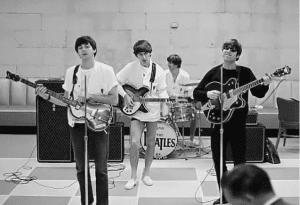How King Crimson Were Directly Affected By The Beatles Disbandment

King Crimson live at Hyde Park, 1969 - King Crimson / Youtube
We all turn to music to understand the times we live in. From anthems of rebellion to carefree summer jams, songs paint vivid pictures of the social and cultural landscapes they emerge from. Yet, music rarely delves into specific events with biographical detail.
Historical accounts typically rely on cold, hard facts presented in newspapers and surveys, not the power of melody and rhythm. However, the progressive rock band King Crimson defied this trend with their 1970 track “Happy Family”.
Nestled within this seemingly lighthearted title and its complex soundscape lies a hidden message, a metaphorical tale spun around a very real event: the shocking disbandment of The Beatles.
Music as a mirror of public opinion
The popularity of music can be a powerful indicator of public sentiment at a given time. Take the Sex Pistols’ rebellious anthems in the 1970s or the anti-Cold War messages woven into the music of Sun-Ra and Prince in the 1980s.
These songs became more than just catchy tunes; they captured the frustrations and anxieties of a generation. Music, in this way, serves as a historical record, not just for entertainment, but also for understanding the societal mindset during its creation.
However, music rarely adopts a purely historical narrative. While some concept albums draw inspiration from historical events to build their themes, music more often reflects the present than the past.
It’s a snapshot of the emotions and concerns of the people who create and consume it, offering a glimpse into the spirit of the times.
King Crimson’s encrypted eulogy
King Crimson’s 1970 track “Happy Family” stands out as a unique anomaly in their catalog. This song, from their album Lizard, utilizes metaphor in a surprising way – to narrate the story of the Beatles’ disintegration.
Pete Sinfield, the lyricist, crafts a seemingly fictional narrative involving characters named Judas, Rufus, Silas, and Jonah. However, a deeper dive reveals them to be symbolic representations of the individual Beatles.
Judas embodies Paul McCartney, Rufus portrays Ringo Starr, Silas stands in for George Harrison, and Jonah takes on the role of John Lennon.
Why “Happy Family” is unique
“Happy Family” stands out not just for its unique storytelling, but also for its surprising subject matter. Though not their most well-known song, it showcases the band’s innovative approach to songwriting.
While musicians often strive for originality, King Crimson chose to tell a familiar story in a fresh and captivating way. The Beatles’ disbandment was a monumental event in music history, yet it rarely finds direct expression in song. Musicians often cite the Beatles as influences, but rarely attempt to capture their essence or story through music.
This lack of musical tributes seems puzzling. Countless books explore the legacy of the Fab Four. Why haven’t more artists used music, the medium closest to their impact, to document their influence and history?
Breaking the mold with a unique song
The song remains a testament to the band’s dedication to defying expectations. First, it shatters the typical musician-influence dynamic. Instead of simply acknowledging the Beatles’ inspiration, they take the bold step of writing directly about them.
Furthermore, they utilize music as a tool for historical commentary, offering a retrospective analysis rather than a knee-jerk reaction to current events. With knowledge of its hidden message, the song becomes a treasure trove for the attentive listener, offering layers of meaning to be unraveled on repeat listens.
One might wonder how a song so blatantly about another band can still define the creators. Yet, “Happy Family” is a potent distillation of King Crimson’s essence. While the narrative revolves around the Beatles, the band’s signature traits shine through.
Sharp observations, intricate musicianship, and a distinct sense of identity infuse the song, making it undeniably King Crimson despite its subject matter.












